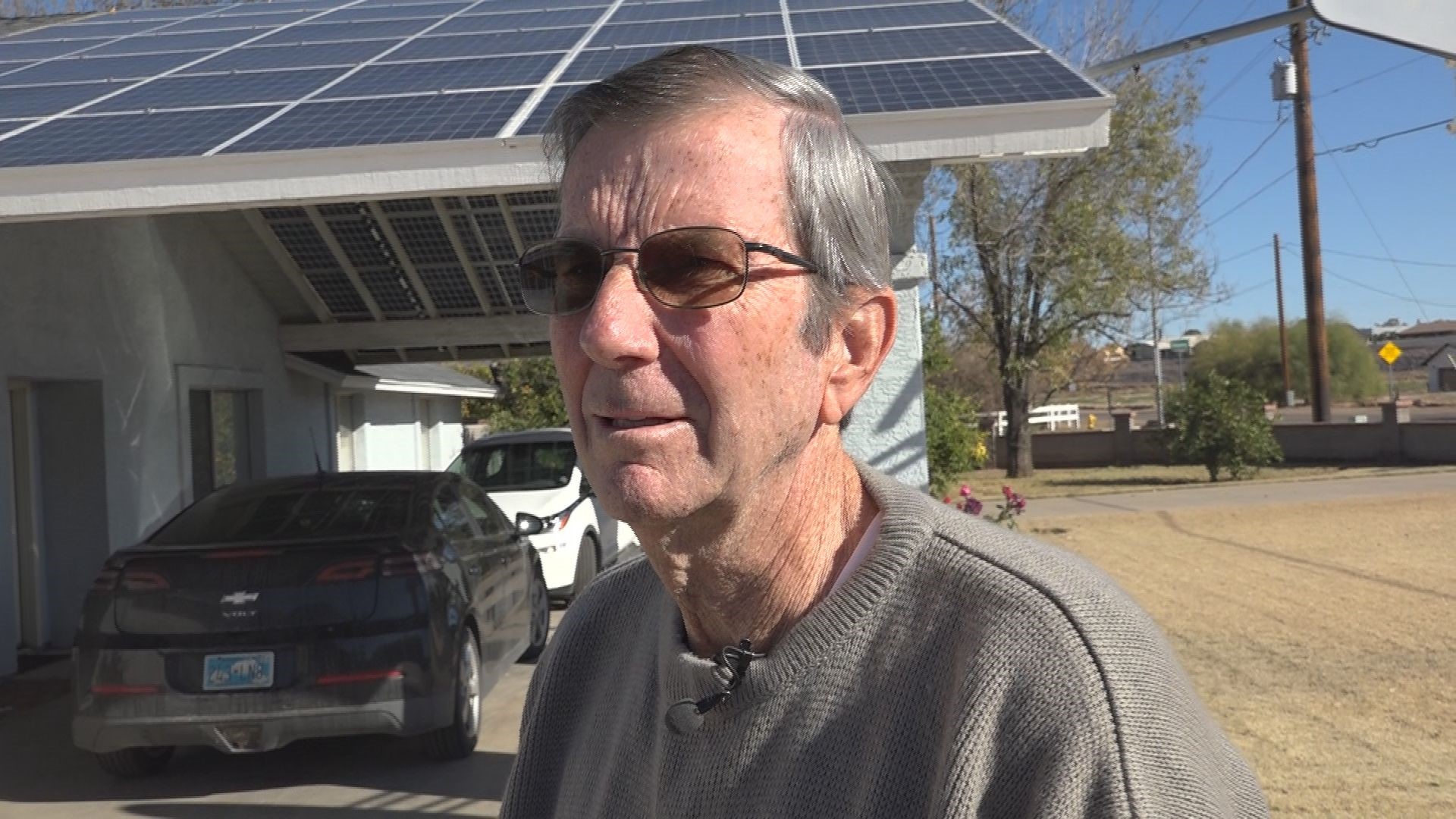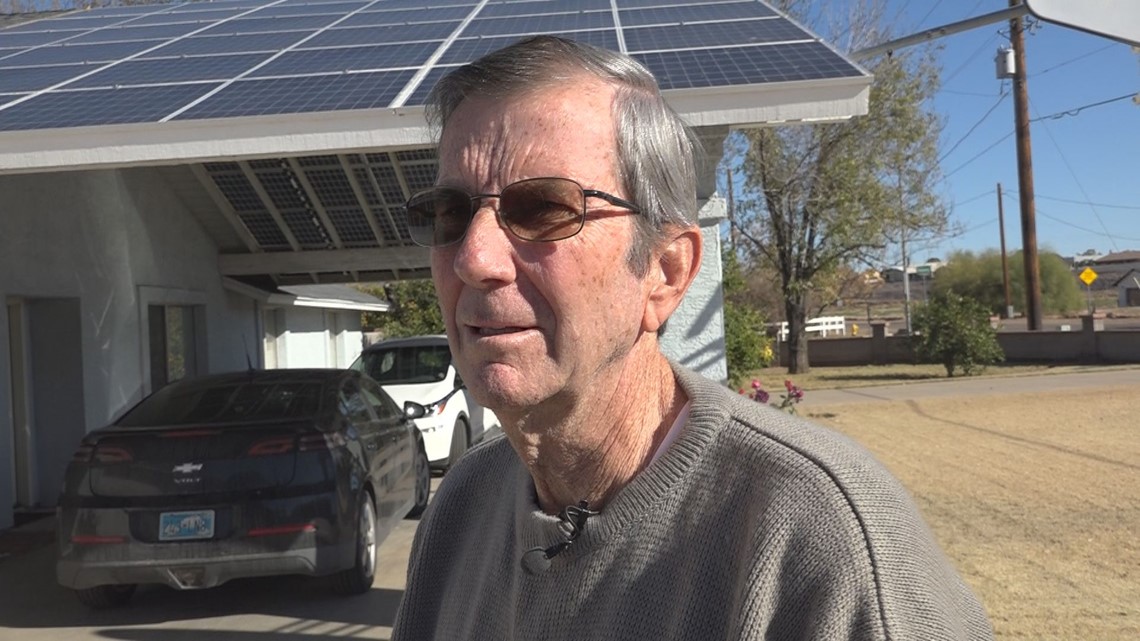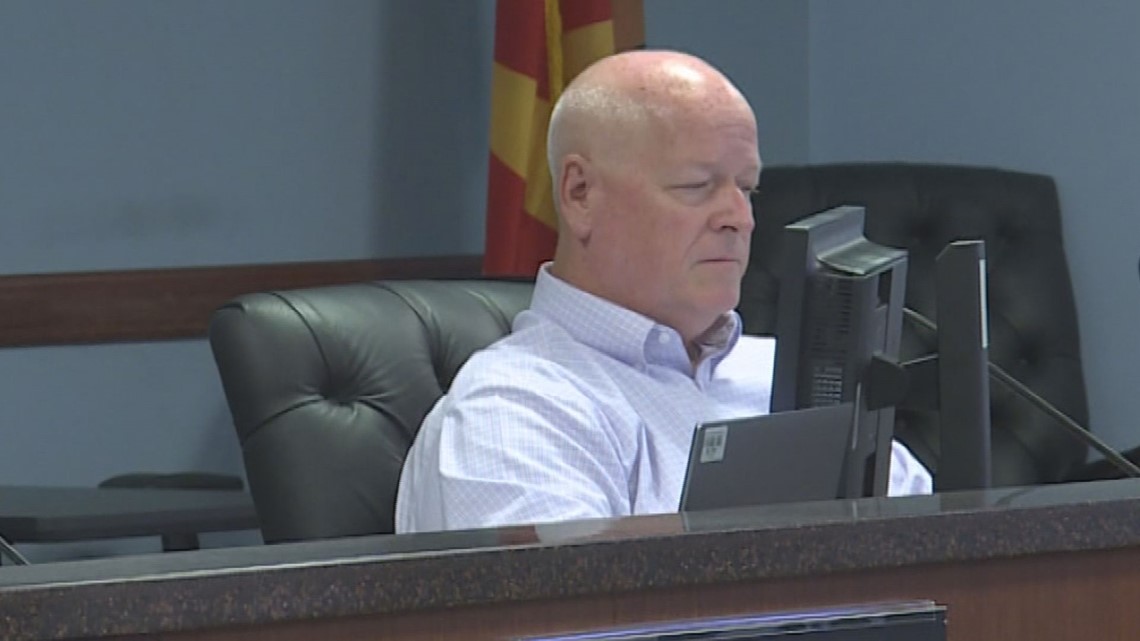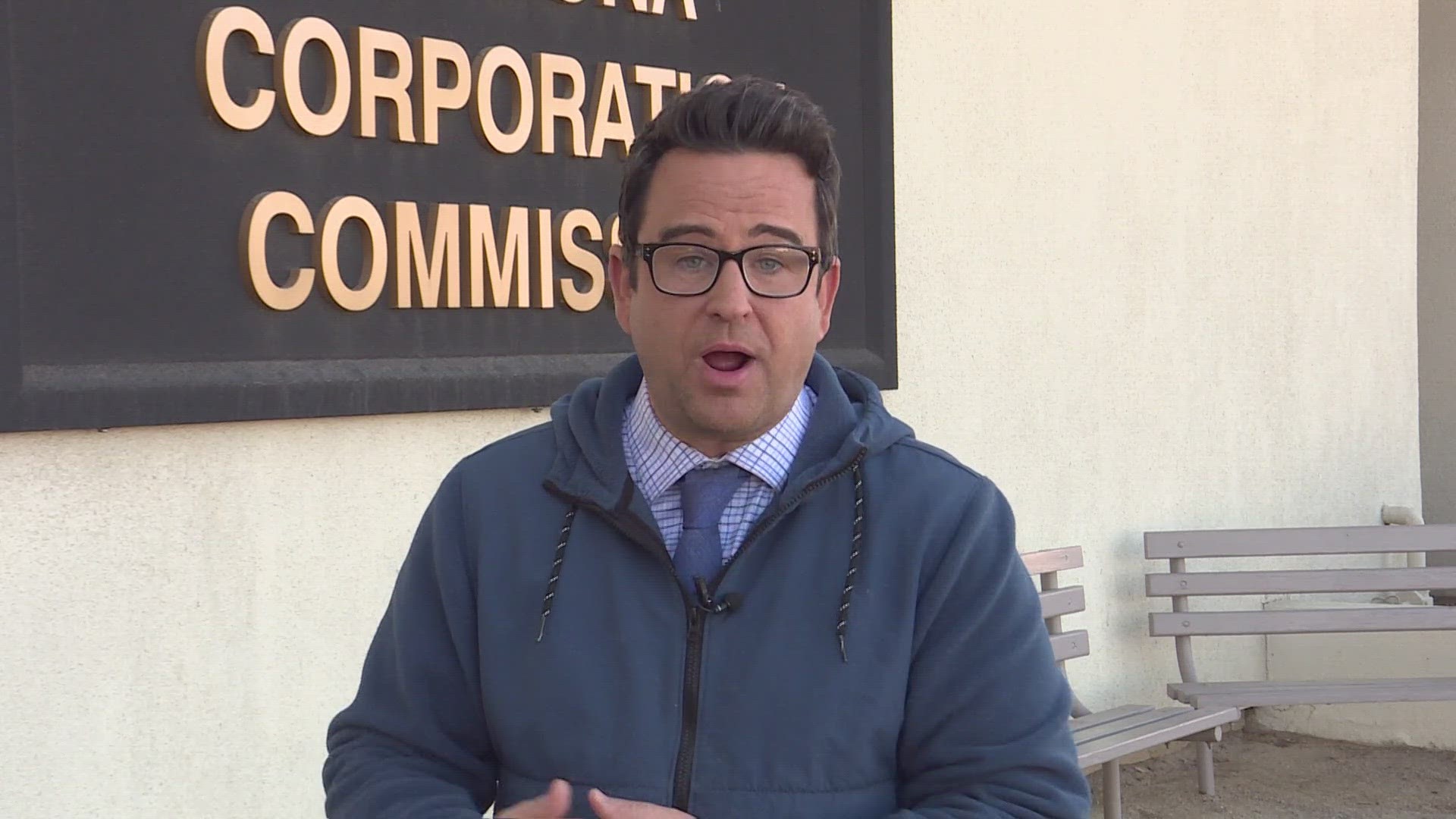Read this story: The institution that regulates utilities consistently voted against consumers, watchdog says
2023 was an especially tough year for captive utility customers. Commissioners passed several bill hikes and fuel adjustment increases, a watchdog found.

For four decades, Steve Neil of Mesa has been studiously following what is probably the least understood government body in the state: The Arizona Corporation Commission.
Neil routinely offers public comment on complex energy policy disputes and he attends monthly work group meetings at APS, even though he’s an SRP customer. Neil says his activism stems from his love for the planet and its most vulnerable citizens.
“Always remember, these price increases hurt the least of our people in the community the most.”
>> Download the 12News app for the latest local breaking news straight to your phone.
Chapter 1 'A bad one for the consumer'
Last year was an especially tough one for captive utility customers. Commissioners passed several bill hikes and fuel adjustment increases for the utilities Southwest Gas, APS and TEP.
In Neil’s view, the final score between the interests of consumers and the interests of the utilities was lopsided.


“2023 has been a bad one for the consumer,” Neil said. “Big monopoly utilities are gaining more and more power and they are able to get their way more than in the past.”
Six big votes. Consumer agency opposed all six.
Although every vote by the commission usually involves complex factors, what’s clear is that consumer advocates took losses at every turn.
The Residential Utility Consumer Office, RUCO, is a state agency that represents the interest of consumers at the commission. A 12News analysis of six major votes at the commission in which RUCO took positions shows RUCO opposed all six votes.
Four of the votes involved the commission raising utility rates or reimbursing utility companies for higher fuel costs, thereby impacting customer bills. In those cases, RUCO proposed more modest approaches they argued would have impacted customers less severely in the short term.
Thompson: Commission refocused utilities on “core competency.”
Republican Kevin Thompson defends the commission’s 2023 record, saying they made difficult decisions the previous commission was unwilling to make.
“This current Commission has done more to refocus the utilities on their core competency of providing service,” Thompson said. He says the commission’s job is to look comprehensively at all stakeholders, including RUCO. He also criticized one of RUCO’s recommendations last year to address an APS fuel increase by placing at least a portion of it into a rate case.
“If we would have followed RUCO’s recommendation and placed the debt into rates, APS would not only recover their cost, but they would earn a rate on return on that cost,” Thompson said.
ACC‘s legal filing regarding APS fuel surcharges shows RUCO did not specifically recommend the issue be rolled into the rate “base,” as Thompson alleged, but rather that it be addressed in a rate case generally. RUCO said a rate case was the only “adequate venue” to address “the reasonableness” of APS’s fuel budgets, “both past and future.”
Asked about the impact of the commission’s votes last year, which already led to a 3rd quarter year over year increase of 12% per Kilowatt hour on APS bills, Thompson said the previous commission shares blame.
“The previous Commission repeatedly kicked the can down the road, causing debt to grow exponentially because of the interest,” Thompson said. “They simply stopped ‘paying the bill’ and delayed that debt for future collection, truly hurting the consumer.”
Thompson and Republican colleagues Nick Myers and Jim O’Connor voted “yes” on all six decisions opposed by RUCO. Republican Lea Márquez Peterson voted “yes” in four of the six. Democrat Anna Tovar voted “no” on all six.
“We have an obligation to think of more than just the utility’s bottom line; we must also look out for the customers,” Tovar said in August regarding one of the votes, a 9.55% “return on equity” TEP rate hike.
Thompson was the only commissioner to respond to requests for comment for this story.
Commission disregarded RUCO's cost-sharing recommendation
Neil says he agrees the “can was kicked down the road a little bit” by the previous commission because he says commissioners were nearly unified in their sensitivity to the effects of the pandemic on consumers.
“But instead of coming up with a better system to address these issues, this commission just passed on the expenses and more,” Neil said.
For example, RUCO recommended utilities be required in the future to share the cost of volatile fuel increases. Under the current rate structure, ratepayers pay 100% of fuel price increases and have no control over APS’s fuel purchasing decisions.
“RUCO has been recommending a sharing mechanism between ratepayers and utility that has been rejected by the commission. In the TEP case it was rejected,” said Daniel Pozefsky, Chief Counsel for RUCO. The agency is recommending the same for the current APS rate case.
Commission excluded RUCO from surprise APS court settlement
In another decision in June, commissioners voted 4-1 to settle two long-running legal battles with APS. While arriving at the joint resolution agreement, the commission excluded two of the four parties of the case during negotiations, RUCO and the Sierra Club. Critics questioned why the commission settled.
“It is shameful for the commission to put its tail between its legs and give APS everything it wanted,” said consumer advocate Abhay Padgaonkar at the time
Former Republican Commissioner Justin Olson later said he didn’t see “any other advantage to ratepayers from this settlement” besides one component of the agreement that reduced the risk of the courts limiting the commission’s authority in future cases
The settlement included a new surcharge on APS bills, most of which relates to reimbursements for upgrades at the coal fired “Four Corners” power plant (known as selective catalytic reduction or SCRs). APS requested $215 worth of reimbursements from customers for the project.
An appellate judge had ruled an evidentiary hearing was needed to determine whether the project was considered “prudent.” Instead of holding an evidentiary hearing, Commissioners and their attorneys decided to settle with APS and agreed customers would pay the company a total of $565 million over 15 years through the surcharge. Commissioners justified the settlement as “fair… and in the public interest,” saying it avoided a protracted legal battle.
RUCO wrote “the only party that benefits from the joint proposal is APS,” in a legal filing.
The Sierra Club slammed the commissioners’ decision, saying they failed in their duty to “protect ratepayers from utility overreach.”
“The Commission’s adoption of the joint resolution between the Legal Division and APS authorizes full rate recovery of SCR expenditure despite no evidentiary finding from either this Commission or any Arizona court that the SCRs’ were, in fact, a prudent investment,” the Sierra Club wrote.
Adding fuel to criticism of the settlement, New Mexico regulators recently rejected that state’s largest utility’s efforts to recoup costs for the same project. Regulators said the investment wasn’t prudent. As a result, New Mexico customers will see a decrease in rates.
Neil: “The scales have tipped”
The August TEP rate case also involved a move by the commission that RUCO Chief Counsel Pozefsky called “unusual.” The administrative law judge in the case recommended a 9.4% ROE plus a .2% return on the “fair value increment” for TEP. RUCO supported that recommendation.
The commission ended up giving TEP a higher return on the ROE of 9.55% after making a verbal amendment after conversation with the company.
Amendments in a rate case are typically submitted in writing into the docket, giving other stakeholders a chance to weigh in, Pozefsky said.
“The commission negotiation directly with the company from the bench was an unusual step,” Pozefsky said.
Neil said RUCO, and subsequently regular Arizonans, have less influence at the commission.
“I love hearing the perspective of the monopoly utility and I love hearing the perspective of RUCO. But lately that balance has diminished, and the scales have tipped with the monopoly utilities gaining the favor of the commission,” Neil said.
Asked about RUCO’s opposition to the commission’s votes in 2023, Thompson said, “The Commission must ensure decisions not only protect the consumer, but must also be mindful of just and reasonable returns as outlined in the Arizona Constitution.”
Neil called Thompson’s comment a “Freudian slip.”
“The Constitution doesn’t say anything about just and reasonable returns for the utility. It talks about just and reasonable charges to the consumers of those goods,” Neil said. “This sums up everything I’m seeing this year at the commission in a nutshell. I understand your position much better now, Mr. Thompson.”
Other votes by the commission in 2023
There are other reasons why consumer advocates — and even former Republican Commission Chair Bob Burns — accuse the commission of favoring utilities over customers.
Burns points to votes by the commission last year to dismiss an ethics complaint involving Thompson’s meetings with utility investors, and the commission’s vote to approve construction of two APS gas turbines without allowing public comment.
RUCO did not take a position on either case. Burns also cites the commission’s October 3-2 vote to reopen the APS “Value of Solar” rate structure, a move Burns alleges will allow “government protected monopoly utilities” to “deprive their customers of viable alternatives." RUCO opposed that decision as well.
Regarding rooftop solar energy, Thompson said he has consistently supported an “all of the above” approach to generation as long as it’s cost effective and reliable.
Chapter 2 Significant ACC votes in '23
The ACC held several major votes throughout the year. While there were six big ones that RUCO opposed, all of them have had an impact on landscape of Arizona's infrastructure. Here's how the watchdog agency weighed in.
Source: ACC Public Records
January:
ACC votes 4-1 for historic 9.4% revenue hike for Southwest Gas.
RUCO: Opposed. RUCO recommended slightly lower increase of 9.31%.
February:
ACC votes 5-0 to grant APS deadline extension and allow it to re-file for DDSR tariff pilot project by October with option for APS to request new extension. APS announces in June the termination of the DDSR tariff pilot project. ACC has taken no further action regarding the announcement by APS.
RUCO: No position
March:
ACC votes 4-1 for 153% Hike for APS Fuel Reimbursements. This amounts to nearly three-times the annual cap in the plan of administration. The PSA increase will reimburse APS over 2 years for fuel costs. ACC also authorized APS to include a third-party storage contract in their power supply adjustor.
RUCO: Opposed the option approved by the Commission. RUCO recommended the PSA application be moved into the rate case for “final resolution.”
ACC votes 4-1 to establish energy storage policy. It gives utilities full control over whether to implement a community solar program or pilot program in its territory.
RUCO: Neutral. It stated if the Commission wanted to evaluate a Community Solar program, it should implement an APS pilot program first and the Commission should “proceed cautiously.”
May:
ACC votes 3-2 to approve a PSA rate increase for TEP fuel adjustor to reimburse fuel costs. It is expected to add an average $9.87 to monthly bills for one year.
RUCO: Opposed. RUCO recommended an alternative payment plan over two years to “ease the pain,” and recommended putting a portion of owed expenses in the rate case.
June:
ACC votes to approve a joint resolution between APS and Commission Legal Division Staff to settle ongoing legal cases to avoid “further litigation expense.” The settlement created the Court Resolution Surcharge starting on July 1st.
RUCO: Opposed the settlement.
July:
ACC votes 4-1 to approve rate increase for Southwest Gas for “Under-collected Gas Cost Balancing Account”. The vote allows Southwest Gas to recoup an under-collected $357 million over a period of 24 months.
RUCO: No position
August:
ACC votes 4-1 to approve 9.55% ROE. The rate increase for TEP is projected to result in residential customers seeing their bills rise by an average of $11 per month.
RUCO: Opposed. RUCO supported the ALJ recommended 9.4% ROE plus a .2% return on the “fair value increment.” RUCO also recommended a sharing mechanism between the utilizes and customers for the fuel adjustor.
October:
ACC votes 3-2 to re-open “Value of Solar” rate structure.
RUCO: Opposed. RUCO files motion to intervene.
November:
ACC votes 4-0 to approve APS request to amend environmental certificate for construction of 2 gas turbines near Coolidge.
RUCO: No position
Chapter 3 Commissioner Thompson responds to questions
The following are written questions and answers between 12 News and Commissioner Kevin Thompson regarding the commission’s votes in 2023 and concerns raised by consumer advocates.


Kevin Thompson (R) is in his second year at the Arizona Corporation Commission. Thompson says he is balancing the concerns of many stakeholders through his votes.
12News: Given RUCO’s opposition to key votes in 2023, do you have any concern that your votes are not in the best interests of utility customers?
Thompson: RUCO is the consumer advocate, and as such, is uniquely focused solely on the consumer. The Commission’s job is to look comprehensively at all stakeholders, including ratepayers. The Commission must also review a utility’s assets to ensure they are used and useful, and are prudent in providing service to the consumer. The Commission must ensure decisions not only protect the consumer, but must also be mindful of just and reasonable returns as outlined in the Arizona Constitution.
12News: What do you consider your most important accomplishments you took in 2023 to protect utility customers? Do you believe there are significant votes left off of this list? If so, which ones?
Former Republican Commission Chair Bob Burns and consumer utility advocate Abhay Padgaonkar both accuse this current commission of showing signs they are “captive to utilities.” They point to many of the above votes, and the commission’s handling of Padgaonkar’s ethics complaint, as proof. What is your response?
Thompson: This current Commission has done more to refocus the utilities on their core competency of providing service. Prior Commissions actually hurt the consumer and decreased the reliability of the grid by mandating and forcing utilities into less reliable generation. Look no further than the Solana Generating Station where the utilities were forced into a 30-year contract for solar at a cost that is nearly three times the cost of power that can be bought on the market today. How is that in the best interest of the consumer?
12News: Two votes in 2023 by this Commission have already led to bill hikes for APS customers. The most recent federal data provided by APS shows the 3rd quarter of 2023 compared with the 3rd quarter of 2022 resulted in a 12% increase per Kilowatt hour for all APS customers. What is your message to APS customers concerned about their electricity bills?
Thompson: The increase was because of the PSA. The previous Commission repeatedly kicked the can down the road, causing debt to grow exponentially because of the interest. Instead of kicking the can down the road, prior Commissions should have made the hard and financially responsible decision to recover the cost when the bills first started piling up. Instead, they simply stopped "paying the bill" and delayed that debt for future collection, truly hurting the consumer. As you mentioned, the fuel cost is a pass-through cost, so the utility doesn’t earn a rate of return on that debt. However, if we would have followed RUCO’s recommendation and placed the debt into the rates, APS would not only recover their cost, but they would earn a rate of return on that cost. How is that in the best interest of the consumer?
12News: Commission Chair O’Connor recently said there is a “war on fossil fuels,” citing renewable energy subsidies. What is your opinion about his message?
Thompson: I agree with Chairman O'Connor. It's undeniable that there has been a concerted effort for at least a decade to eliminate fossil fuels. Unfortunately, the technology needed to replace fossil fuels isn’t where it needs to be yet, and thus it would be irresponsible at this point to entirely eliminate generation using fossil fuels. The sun doesn’t shine at night, the wind doesn’t always blow, and our hydro is slowly decreasing. FERC Chair Willie Phillips said it best in testimony to the Senate Energy and Natural Resources Committee: “I believe in an all-of-the-above approach. Whatever resources are needed to keep our grid reliable; we have to make sure they are available."
12News: Do you have an opinion about the scientific consensus that fossil fuels are causing rapid, unprecedented climate change? Does this opinion impact your decisions about Arizona energy policy?
Thompson: I have consistently stated that I support an “all of the above” approach to generation as long as it’s cost effective and reliable. As this past summer showed, it gets really hot in Arizona, and to that end, the utilities are charged with and accountable for ensuring the power is available when it’s needed most.
12News on YouTube
Catch up on the latest news and stories on our 12News YouTube playlist here.

